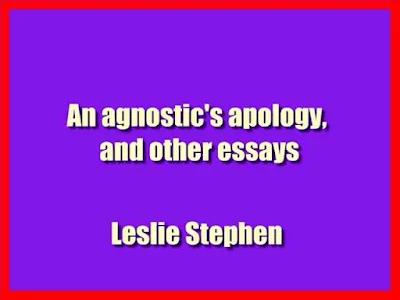An agnostic's apology, and other essays
The name Agnostic, originally coined by Professor Huxley about 1869, has gained general acceptance. It is sometimes used to indicate the philosophical theory that Mr Herbert Spencer, as he tells us, developed from the doctrine of^Hamilton and Mansel.
Upon that theory, I express no opinion. I take the word in a vaguer sense and am glad to believe that its use indicates an advance in the courtesies of controversy. The old theological phrase for an intellectual opponent was Atheist— a name which still retains a certain flavour as of the stake in this world and hell-fire in the next, and which, moreover, im- plies an inaccuracy of some importance.
Dogmatic Atheism — the doctrine that there is no God, whatever may be meant by God — is, to say the least, a rare phase of opinion. /The word Agnosticism, on the other hand, seems to imply a fairly accurate appreciation of a form of creed already common and daily spreading.
The Agnostic is one who asserts — what no one denies — that there are limits to the sphere of human intelligence. He asserts, further, what many theologians have expressly maintained, that those limits are such as to exclude at least what Lewes called ' metempirical ' knowledge. But he goes further, and asserts, in opposition to theologians, that theology lies within this forbidden sphere.
This last assertion raises the important issue; and, though I have no pretension to invent an opposition nickname, I may venture, for the purposes of this article, to describe the rival school as Gnostics.
The Gnostic holds that our reason can, in some sense, transcend the narrow limits of experience. He holds that we can attain truths not capable of verification, and not needing verification, by actual experiment or observation.
He holds, further, that a knowledge of those truths is essential to the highest interests of mankind, and enables us in some sort to solve the dark riddle of the universe. A complete solution, as everyone admits, is beyond our power. But some answer may be given to the doubts which harass and perplex us when we try to frame any adequate conception of the vast order of which we form an insignificant portion.
We cannot say why this or that arrangement is what it is; we can say, though obscurely, that some answer exists, and would be satisfied if we could only find it. (Overpowered, as every honest and serious thinker is at times over-powered, by the sight of pain, folly, and helplessness, by the jarring discords which run through the vast harmony of the universe, we are yet enabled to hear at times a whisper that all is well, to trust to it as coming from the most authentic source, and to know that only the temporary bars of sense prevent us from recognising with certainty that the harmony beneath the discords is a reality and not a dream. This knowledge is embodied in the central dogma of theology. God is the name of harmony, and God is knowable^ Who would not be happy in accepting this belief if he could accept it honestly?
Who would not be glad if he could say with confidence: ' the evil is transitory, the good eternal: our doubts are due to limitations destined to be abolished, and the world is really an embodiment of love and wisdom, however dark it may appear to our faculties '? And yet, if the so-called knowledge is illusory, are we not bound by the most sacred obligations to recognise the facts? Our brief path is dark enough on any hypothesis.
We cannot afford to turn aside after every ignis fatuus without asking whether it leads to sounder footing or too hopeless quagmires. Dreams may be pleasanter for the moment than realities, but happiness must be won by adapting our lives to the realities.
Contents:
I. An Agnostic's Apology
II. The Scepticism of Believers
III. Dreams and Realities
IV. What is Materialism ?.
V. Newman's Theory of Belief
VI. Toleration . . . .
VII. The Religion of all Sensible Men
Download An agnostic's apology, and other essays - 7.6 MB


